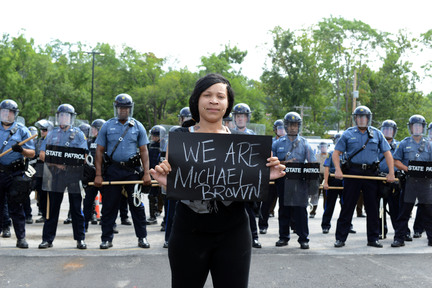Darryl Pinckney’s piece on Ferguson in NYRB is worth reading:
‘Yet the Ferguson movement has promised that the situation cannot go back to normal, to the way things have been. Everybody knows what racism is. The problems needn’t be explained over and over. They can’t be deflected by saying that Michael Brown took some cigars from a store, that he broke the law and therefore it was proper to kill him with six bullets, although he had no weapon. This is the kind of thinking that racism hides behind. Ferguson feels like a turning point. For so many, Brown’s death was the last straw. Black youth are fed up with being branded criminals at birth. Ferguson was the country stepping back in time, or exposing the fact that change hasn’t happened where most needed, that most of us don’t live in the age of Obama. “It’s a myth that we’re a fair society,” Sekou said. “We have to take that needle out of our arms.”’
Read the complete article here.
Unfortunately, I’m not convinced that Ferguson will be a turning point.
In March of this year the New York Times reported about a report by the Urban League: ‘Nationwide, black Americans are twice as likely to be unemployed as whites (13.1 percent of blacks versus 6.5 percent of whites, according to data from the Bureau of Labor Statistics). The rate for Hispanics was 9.1 percent. The report also focused on underemployment which includes those who are jobless and not looking or working part-time jobs but desiring full-time work. According to the report, the underemployment rate for black workers was 20.5 percent, compared with 18.4 percent for Hispanic workers and 11.8 percent for white workers.’
Read the article here.
Read the report here.
If Ferguson is going to be a turning point then the unemployment gap (and the income gap) between black and white should get smaller in the next couple of years. If not, Ferguson may have been many things but not a turning point.
